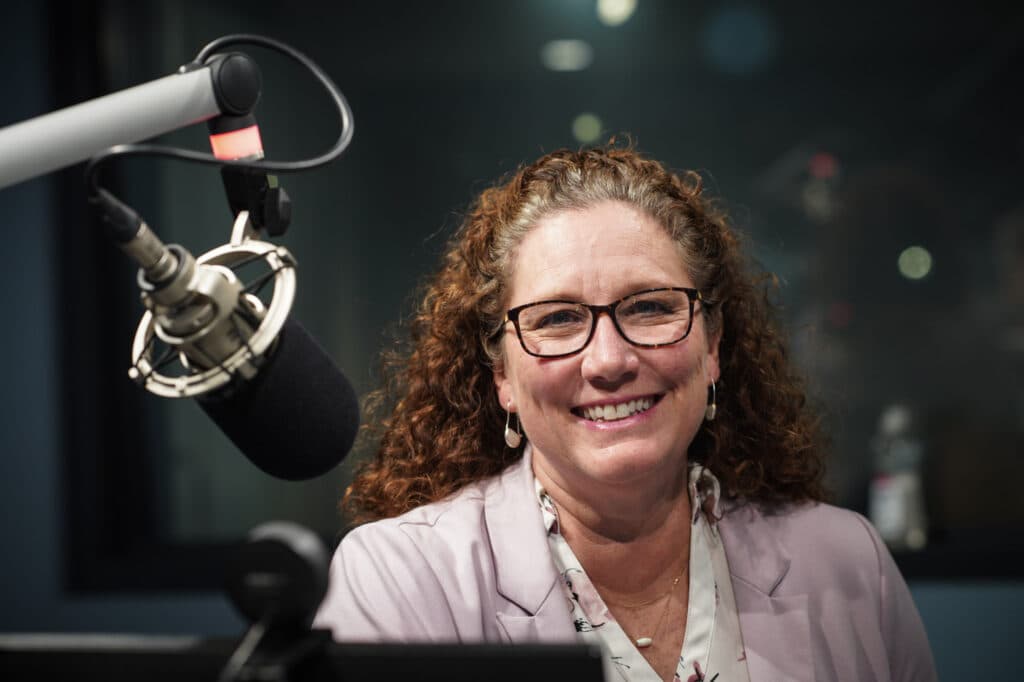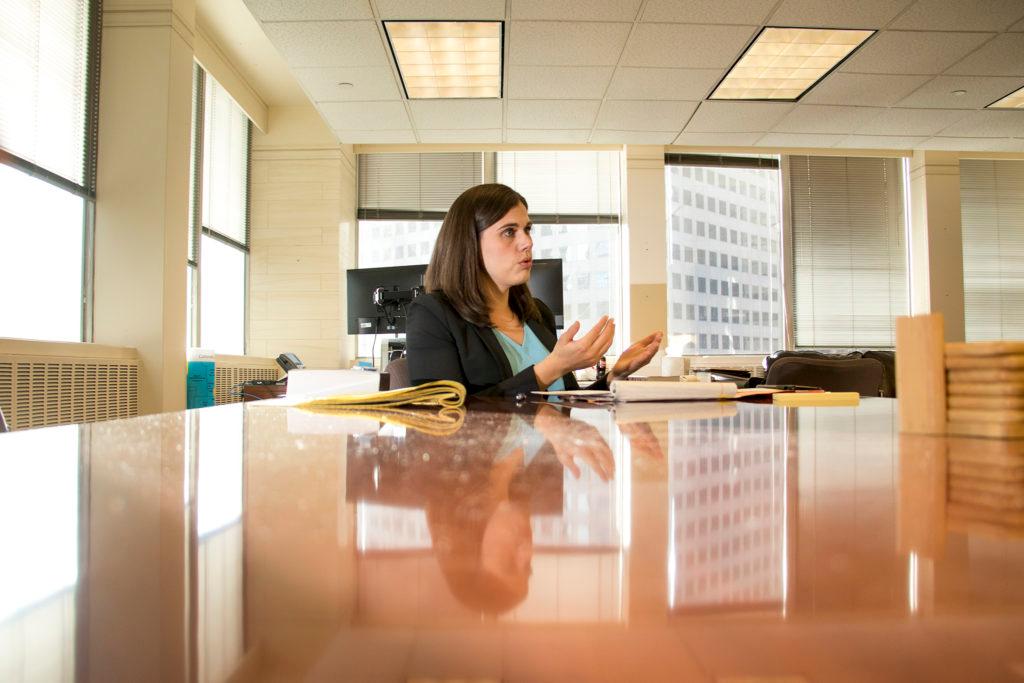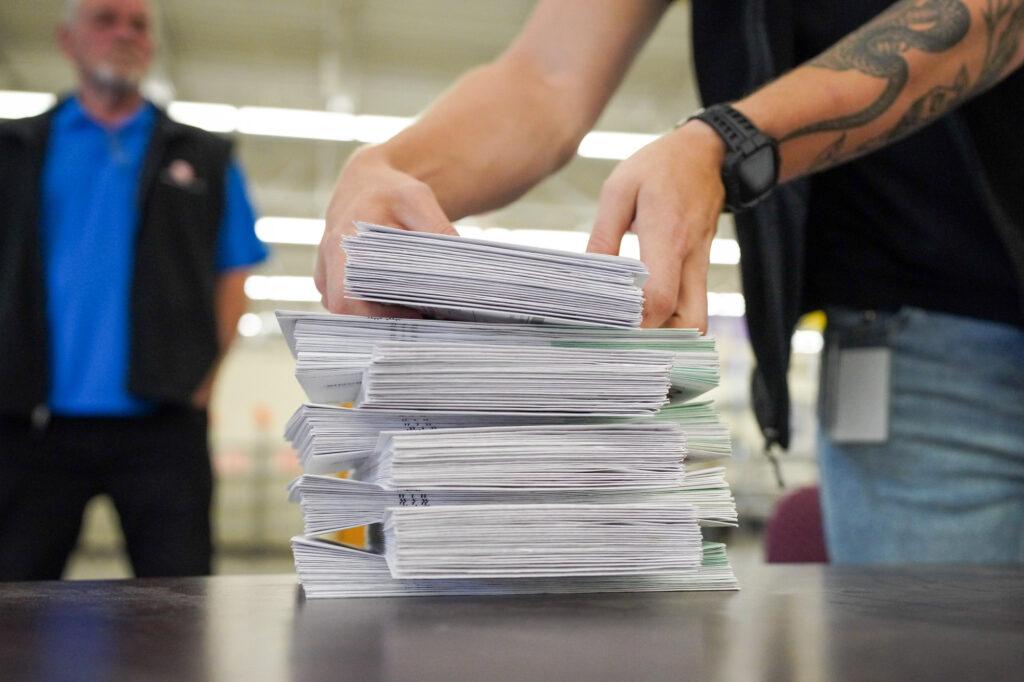
Voters in Colorado’s GOP primary will be choosing a nominee for the state’s top election job from among candidates with deep divides over the fundamental fairness of the election system and what it should look like in the future.
The issue of election integrity is front and center for the three Republican candidates vying to take on Democrat Jena Griswold this fall, who is seeking a second term in the job.
Who is Tina Peters
Arguably the most well-known and polarizing of the candidates is Mesa County Clerk and Recorder Tina Peters who has garnered national attention for allegedly violating the security of her office in search of proof that the 2020 election was stolen from Donald Trump.
Peters, a former businesswoman, was a political newcomer when she ran for clerk four years ago on a platform of reopening shuttered DMV offices.
Her time in office has made her the epicenter of controversy in her county. Months after overseeing the 2019 election, her first as clerk, staff discovered hundreds of ballots had never been collected from the drop box in front of the office. That situation fueled an unsuccessful recall effort.
And then, earlier this year, Peters was indicted on ten counts of tampering with election equipment and misconduct in her efforts to try to uncover alleged fraud by the county’s Dominion Voting Systems machines. She was barred by a judge from overseeing Mesa County’s elections last year and will not be allowed to run them this year either.
Peters maintains that she did nothing wrong when she allowed an unknown person to copy the machines’ hard drives and called the indictments “laughable.”
“If I have to be controversial to get the truth out, I'm not afraid of that. And that would make me dangerous, ‘cause I'm not afraid,” she told CPR.
State audits and hand counts have verified the accuracy of the 2020 election results, and other county clerks in the state have pushed back against false claims of widespread fraud.
Peters’ belief that Colorado’s election equipment has been used to perpetrate major fraud means, as Secretary of State, she would push for fundamental changes to how Coloradans vote: She wants to do away with the all-mail ballot system and return to precinct-level voting and hand counting of ballots. Those changes would have to be approved by the legislature.
“If you have a computer, it can be hacked. And these (voting machines) have so many vulnerabilities … I mean, the Secretary of State accused me of security breaches. No, she's the one that has the security breaches,” Peters said. “I just found it out.”
Peters said she wants the Secretary of State’s office to “not to be so partisan and controversial.”

Who is Pam Anderson
She is competing against Pam Anderson, a former Jefferson County Clerk and Recorder and a past executive director of the bipartisan Colorado County Clerks Association. Anderson was the first Republican to get into the race and said she did so out of concern that the public’s trust in elections is eroding, a shift she dates back to 2016 and the doubts Donald Trump sowed during his first bid for president.
Unlike Peters, Anderson supports Colorado’s mail ballot-based election system and believes in the overall integrity of the system.
“I have been very upfront about my belief in evidence-based elections and that I have seen no evidence (of widespread fraud). I've read all of the reports. I've been in many places around the country” to see their processes, she said.
Anderson is making the pitch to voters that she is an election professional who would be a steady non-partisan hand, one who would address the concerns of voters of all political stripes — something she argues isn’t the case with Peters, or Griswold.
“I mean, people of good conscience that have questions about how our elections work,” she said. “And I really feel like having a professional in that office that will answer questions — and not vilify folks for it — will take it down a notch, really restore some of that trust that has been eroded over the last few years.”
Who is Mike O'Donnell

Rounding out the candidates is political newcomer Mike O’Donnell, a naturalized U.S. citizen who was born in Australia and now lives in Yuma county. For twenty years he led a non-profit, Colorado Lending Source, which helped small businesses secure loans.
O’Donnell said he’s trying to take a middle-of-the-road approach, carving out a territory between Anderson and Peters. While he has talked a lot on the campaign trail about the need to clean up the voter rolls, he’s also focused on improving how businesses interact with the Secretary of State’s office, which is in charge of licensing.
“My approach is not to be an attack person, which might show compared to some of the other races. And it has been a little challenging because both sides tell me that I should drop out of the race because I'm stealing votes from either of them,” he said.
Anderson’s campaign disputes that assertion and said they have not asked O’Donnell to drop out of the race.
O’Donnell got on the ballot through the GOP state assembly, although Peters won more support — and top billing on the ballot — through that process. Anderson submitted petitions to get on the ballot.
The following views of the candidates are drawn from interviews with CPR News and their comments at a forum hosted by the Foothills Republicans in Jefferson County.

Whether they believe the 2020 election was stolen
Anderson believes the 2020 results were legitimate and has said there is no evidence of any widespread or systematic fraud. She said one of her goals is to help Coloradans to understand how “evidence-based elections” work.
O’Donnell said he doesn’t have enough information to comment one way or the other on the validity of the 2020 election.
“There were lots of people who alleged irregularities in 2016 and a lot more irregularities potentially in 2020,” he said, but “I’m not someone who will tell you definitively one way or the other, and I'd much rather move forward than look back.”
For her part, Peters believes Trump won the 2020 election and highlights that fact as a key difference between her and her opponents.
“Both (Anderson) and O’Donnell believe that Biden won,” she said. “If people aren't willing to at least acknowledge that there's a problem there, I don't see a fix. I don't see them fixing it.”
Where they stand on all mail voting
Peters supports eliminating Colorado’s practice of sending mail ballots to every voter. Instead she thinks they should only be available on request for those living with disabilities or who are out of state during an election.
“We have to get back to looking at what is going to be more secure for the vote, because if we have insecurities in our election processes, it dilutes the vote of the eligible voter,” she said.
Anderson supports keeping the current election rules in place.
“I believe that we have a great system here in Colorado. As county clerk, I led reforms like making sure that every voter has a voter-verified paper ballot. When I talk about voting integrity, I believe it's making sure it's fair and accurate and accessible.”
O’Donnell said Colorado’s current system, which was created by a 2013 law, has been in place for too long now to try to undo it.
“People have gotten very used to that. It's possible the legislation could do it, but it's gonna be something that would be very unpopular,” he said.
Both O’Donnell and Anderson are critical of the state’s move to an opt-out model of automatic voter registration, which they argue has resulted in inaccurate registrations cluttering the voter rolls.

Where they stand on the use of electronic voting machines
While all Colorado voters get paper ballots in the mail, machines are deeply involved in the state’s elections.
Most counties rely on electronic systems to scan and tally their returned ballots. Vote Centers are also required to have machine voting available to make it possible for people with disabilities to fill out their ballots independently.
Over the past two years, many of the conspiracies about the 2020 election have come to focus on election equipment and debunked claims that it could be used to switch votes and rig outcomes.
O’Donnell opposes a new state law that requires almost all counties to use machine tallies and not rely solely on hand counts. He said counties should have more leeway in determining which types of machines to use, but that the state’s technology overall is overdue for an upgrade.
“The machines we use in Colorado are compliant with 2005 federal standards. They're not compliant with 2021 standards. That concerns me,” he said. “Having machines that were as secure as we possibly could, would be important for the state moving forward.”
Colorado last updated its requirements for voting equipment in 2015; any machines purchased after that point had to meet the new standards.
Anderson said she supports the current voting system and believes there are already adequate checks and balances — like required accuracy tests before elections and robust audits afterward — in place.
She said she would like to improve and standardize training for election judges on things like verifying the signatures on returned ballots.
“We have a signature verification guide that the judges use. We have some best practices that we utilize and share, but they're optional at the county level,” she said. “By and large, most of our state does utilize them.”
Peters believes that any time a machine is involved in an election it can be hacked. She wants to see Colorado stop using machine tallies altogether and instead require hand counts for all elections.
“We don't need machines,” she said. “We can use machines to verify the hand count if you want, but I think that's a waste of money to the people of the counties.”
Editor's Note: This story has been updated with the Anderson campaign's rebuttal to O'Donnell's statement about being urged to leave the race. It has also been corrected to reflect that the new voting machine standards in 2015 did not require counties to immediately buy new equipment.








